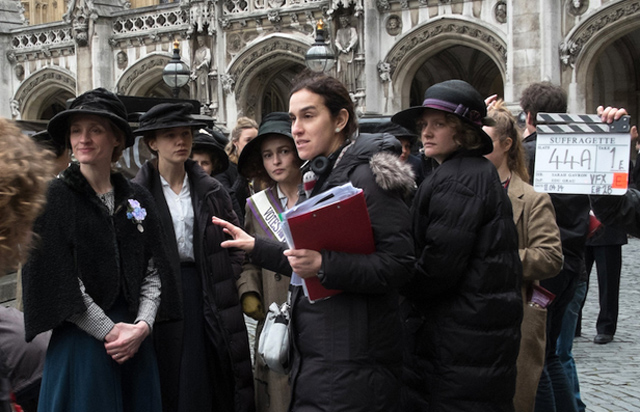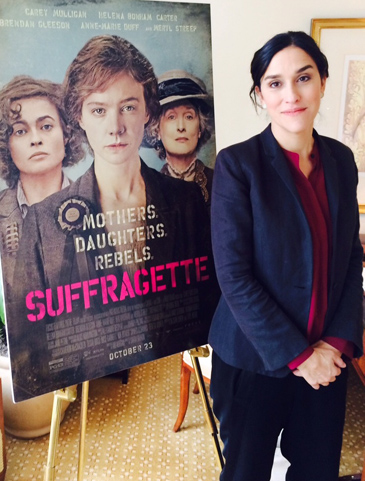CHICAGO – Patrick McDonald of HollywoodChicago.com appears on “The Morning Mess” with Dan Baker on WBGR-FM (Monroe, Wisconsin) on March 21st, 2024, reviewing the new streaming series “Manhunt” – based on the bestseller by James L. Swanson – currently streaming on Apple TV+.
Interview: Director Sarah Gavron Revives the History in ‘Suffragette’
CHICAGO – One decade before the United States gave women the right to vote, it was Britain leading the way before World War One. Their techniques for convincing the staid patriarchy was a series of anarchistic actions, as depicted in the new film “Suffragette,” featuring Carey Mulligan and Meryl Streep, and directed by Sarah Gavron.
The movement began in the late 1890s for the British Isles, but gained steam in the early 20th Century due to the Women’s Social and Political Union, which is the focus in “Suffragette.” Carey Mulligan portrays a lower class working girl named Maud, who becomes part of the political process through fate and her own desire for change. Meryl Streep plays real-life British activist Emmeline Pankhurst, as the film combines true events with the composite journey of Maud.

Director Sarah Gavron on the Set of ‘Suffragette’
Photo credit: Focus Features
Sarah Gavron is a British film director, whose previous works include “Brick Lane” (2007) and the documentary “Village at the End of the World” (2013), and she spoke with HollywoodChicago.com about the politics and passion behind her new movie.
HollywoodChicago.com: This is a woman focused film, written by Abi Morgan and directed by you. How important was it to get a collective female voice into this important story of historical gender equality?
Sarah Gavron: It was vital, because it was a story that had never been told on film, and I hadn’t learned about it in school – it felt both overdue and timely. We were excited of the idea of getting women in front of the camera in principle roles, but we also had a number of women behind the camera in production capacities. There was a great sense of camaraderie, and we were all committed to telling this story we’d never seen on film before.
HollywoodChicago.com: You mentioned you never learned about the British Suffragette movement in your schooling. Why do you think that was the case when you were learning British history?
Gavron: Women’s history there has generally been marginalized, as footnotes in books. The academics who consulted on the film weren’t surprised, they spoke of the difficulties to get women’s history into the classrooms – the lack of knowledge about the British suffragette movement was a symptom of that difficulty. As far as making a film of the events, there aren’t a lot of female production teams, and it was probably going to be a female team that brought it to the big screen.
HollywoodChicago.com: This is your second collaboration with Abi Morgan as writer. What does she bring to a screenplay that allows you to connect the story as a director?
Gavron: She is great at a number of subjects, she is one of the best writers in Britain at the moment, jumping from TV to theater to film, and she’s great at research. There were a number of ways we could have gone with the research available, and she plowed through it and pulled out the ‘beating heart’ of the story and invented the character of Maud, who was a composite character based on a number of working women who were part of the movement.
Abi and I also discovered the police surveillance against the activism of the times, and threaded that in. She works with the actors in rehearsal to rewrite to their style, and she is a collaborator who is just a great running partner throughout the process.
HollywoodChicago.com: There is a very dramatic moment that occurs near the end of the film, which everything kind of leads up towards. Since it was a true incident, what that the hook to hang everything else upon?
Gavron: Yes, all the big set pieces were historically accurate. The anarchy, the police harassment and the imprisonment were all true, and the scene that we used at the end felt like a climatic moment to tie up that part of the history.
HollywoodChicago.com: ‘Suffragette’ is similar to ‘Brick Lane’ as it deals with woman finding a voice. The fight for equality still goes on, as indicated by your postscript on countries and years for the women’s vote. What message of does ‘Suffragette’ give women who are still under governmental or religious oppression?
 Sarah Gavron of ‘Suffragette’ in Chicago Photo credit: Patrick McDonald for HollywoodChicago.com |
Gavron: I hope it is a reminder of how important it is to speak out, and to challenge inequalities. It’s only by doing that can we change. What is exciting now is that there is a new type of activism with the digital age, with a new platform for women to speak out and challenge oppression. It’s also important to remember how difficult it was for women to get the vote, and to remind women that they need to have their voices heard through voting.
HollywoodChicago.com: How much do you believe women’s right are tied into socio-economic factors, especially within poorer countries?
Gavron: There has always, throughout history, been second class status and pay inequalities for women. There has been tremendous progress, but that depends on where you are in the world. We still have a long way to go in some countries.
HollywoodChicago.com: What is within the culture of British history that evolves the society the way it does. For example, the empire let go of slavery twenty years before the United States did, and gave women the vote a decade before the U.S. What is it about the determination in the British personality that seeks such justice?
Gavron: We weren’t necessarily pioneering in giving the vote to women, New Zealand and some of the Scandinavian countries came before us. The British suffragettes actually had to fight harder, because the establishment was so fearful of change. There is social justice, but it was slow to come in this instance. It’s always precarious, we just have to make sure we uphold these rights.
HollywoodChicago.com: What in your educational journey most profoundly tripped your interest in being a filmmaker? Can you pinpoint a moment in which you made the decision to pursue filmmaking as a career?
Gavron: I was interested in drama and art, and my ideas would come in the form of putting it together like a film, but I never thought I could become a director. It wasn’t until my twenties that I actually realized and saw films directed by women, and I dared to put myself forward as a director, and learned more at the national film and television school in Britain.
HollywoodChicago.com: What humbles you the most in the film industry, and what frustrates you the most? How much farther does the industry need to evolve to include more female voices?
Gavron: What humbles me is that films can generate conversation, and with this one it’s been huge and gratifying. It’s opened in the UK, and the response has been great, especially with young people saying they’ll never not vote again. It’s exciting that films can have that kind of reach, and the aim of the film is to tell a story – which only takes place in a two and a half mile radius in one country in 1912 – but reaches out to people today, and connects with themes of the 21st Century and the ongoing struggle.
And yes, what frustrates me is that we don’t have enough women behind the camera, and people from all walks of life, to better represent the diverse society we live in. I really feel passionately that we need to change that, because films reflect society and then also influence people. We need to be sharing and reflecting the world in filmmaking, to realize it more as it is.
HollywoodChicago.com: What is the first thing you talk about, when you talk about your love for filmmaking?
Gavron: It’s telling a good story, something that has meaning. Hopefully, it’s a good ride as well.
 | By PATRICK McDONALD |


